By, Imaam Yakhsyallah Mansur
Let us always offer praise and gratitude to Allah Subhanahu wa Ta’ala who with His grace has made Makkah one of the three blessed places and it is sunnah to visit him.
Millions of people every year visit Mecca to perform the Hajj as the ‘perfection’ of Islam.
May Allah Subhanahu wa Ta’ala open the doors of sustenance so that we are all able to perform the Hajj pilgrimage, as a form of seriousness in carrying out Allah Subhanahu wa Ta’ala’s commands, increasing our faith and piety.
Also Read: Verses of the Universe in Gaza: The Unyielding Light of Faith
Allah Subhanahu wa Ta’ala says in the Al-Qur’an Surah Al-Baqarah [2] verse 189, which reads:
يَسْـَٔلُو نَكَ عَنِ الْاَهِلَّةِۗ قُلْ هِيَ مَوَاقِيْتُ لِلنَّاسِ وَالْحَجِّۗ وَلَيْس الْبِ َ مِنْ ظُهُوْرِهَا وَلٰكِنَّ الْبِرَّ مَنِ اتَّقٰoub ُفْلِحُوْنَ (البقرة [٢]: ١٨٩)
“They asked you (Prophet Muhammad) about the crescent moon. Say, “That is (indicator of) the time for humans and (the pilgrimage of) Hajj.” It is not virtuous to enter a house from behind it, but it is virtuous (virtue) of those who are pious. Enter houses from their doors, and fear Allah so that you may be successful.”
Asbabul nuzul this verse is as narrated by Ibn Abbas that Mu’ad bin Jabal and Tsa’labah bin Ghanam Radhiallahu anhuma, both friends of Anshor, asked Rasulullah Sallallahu ‘alaihi Wasallam about the new moon.
Also Read: Prophet Sulaiman Alaihi Salam, the Greatest Muslim King of All Time
Then, Allah Subhanahu wa Ta’ala revealed this verse explaining that the new moon is a sign of His power to be used for the benefit of mankind, for the sake of togetherness and unification of the people in determining times for prayer, fasting, Hajj and others.
Sheikh Prof. Dr. Wahbah az-Zuhaili in his commentary on Al-Wajiz states, after the previous verses explain the issues regarding fasting, this verse explains the time required by humans to carry out their worship, or as a pillar of the Islamic religion itself.
This verse is also one of the arguments for carrying out Eid al-Fitr and Eid al-Adha as well as the Hajj simultaneously using the ru’yat method, as agreed by the Imams of the Madhab.
This has been shown by the Sharia texts, including the words of the Prophet sallallaahu ‘alaihi Wasallam:
Also Read: Imaam Yakhsyallah Mansur: Surah At-Tin Indicates the Command to Liberate Al-Aqsa
الفِطْرُ يَوْمَ يُفْطِرُ النَّاسُ، وَالأَضْحَى يَوْمَ يُضَحِّي ا لنَّاسُ
“Eid al-Fitr is the day when mankind breaks the fast, and Eid al-Adha is the day when mankind slaughters its victims.” (HR Tirmidhi from ‘Aisyah raḍiyallāhu ‘anhā)
The explanation from the hadith above is that in this case Ummul Mukminin Sayyidatina ‘Aisyah raḍiyallāhu ‘anhā said: “That the day of Arafah (i.e. the 9th of Dzulhijjah) is the day that has been determined by the Imam (Caliph), and the day of sacrifice (Eid al-Adha) is when the Imam slaughters the sacrifice.”
The Hajj pilgrimage has many lessons that can be felt by all Muslims, one of which is the unity of the Ummah. The Hajj pilgrimage has a very high spirit of unity. There is no worship that can gather millions of people from various nations and countries at the same time, in the same place, and for the same purpose, except the Hajj.
Also Read: Imaam Yakhsyallah: Nurture Love for the Prophet, One Will Be with Whom One Loves
Therefore, this fifth pillar of Islam, not only trains humans to always try to get closer and worship Allah Subhanahu wa Ta’ala, but also trains themselves to foster awareness that humans are equal before Him, so that they can foster a spirit of unity without looking at social status.
People who are performing the Hajj are not allowed to perform rafats, fasiq, and jidal (arguments). This is proof that the Hajj must be a momentum to build harmony and unity between Muslims. This is as confirmed in the Qur’an, Allah Ta’ala says:
الْحَجُّ أَشْهُرٌ مَعْلُومَاتٌ فَمَنْ فَرَضَ فِيهِنَّ الْحَجَّ فَلا رَفَثَ وَلا فُسُوقَ وَلا جِدَالَ فِي الْحَجِّ (البقرة [٢]: ١٩٧)
“The Hajj (season) is (in) the months that have been confirmed. Whoever performs the Hajj during those (months), let him not speak dirty words (rafats), commit immorality and quarrel during the Hajj.” (QS Al-Baqarah [2]: 197).
Also Read: Friday Sermon: Emulating the Firmness of the Prophet in Struggle
During the Hajj pilgrimage, all pilgrims are not allowed to quarrel, fight, shed blood, and are even prohibited from destroying plants in the haram lands, Mecca, and Medina.
Self-control during the Hajj pilgrimage should also be an inherent awareness of every Muslim person in everyday life.
Thus, this fifth pillar of Islam will truly be a momentum to build unity, solidarity and harmony between Muslims wherever they come from, regardless of their background and social status.
Sheikh Muhammad Mutawalli As-Sya’rawi was once asked about the positive impact of the Hajj pilgrimage for all Muslims in general. Then he explained that the Hajj pilgrimage should be a momentum to build awareness about the unity of Muslims from various corners of the world.
Also Read: Imaam Yakhsyallah: Muslims Unity as Key to Victory of Islam
The gathering of Muslims with different skin colors, different languages, and different countries, should be a momentum to build awareness that they are all the same, namely the same under one umbrella of Islam.
So, there is no reason to separate, and there is no reason not to love each other.
Differences in ethnicity, race and nation are essentially natural and have been determined by Allah Subhanahu wa Ta’ala as mentioned in the Al-Qur’an. Allah Ta’ala says:
يٰٓاَيُّهَا النَّاسُ اِنَّا خَلَقْنٰكُمْ مِّنْ ذَكَرٍ وَّاُنْثٰى وَجَعَلْنٰكُمْ شُعُوْبًا وَّقَبَاۤىِٕلَ لِتَعَارَفُوْاۚ اِنَّ اَ كْرَمَكُمْ عِنْدَ اللّٰهِ اَتْقٰىكُمْۗ اِنَّ اللّٰهَ عَلِيْمٌ خَب ِيْرٌ (الحجرات [٤٩]: ١٣)
Also Read: Friday Sermon: Prophet Muhammad Is Not a Political Figure
“O people, indeed We have created you from a man and a woman. Then, We made you into nations and tribes so that you might know each other. Indeed, the noblest among you in the sight of Allah is the one who is most pious. Indeed, Allah is All-Knowing, All-Compliant.” (QS. Al-Hujurat [49]: 13).
Sheikh Abdurrahman bin Nashir As-Sa’di in his interpretation stated that differences are not for dividing each other, nor for making each other proud, but for helping each other and getting to know each other.
Therefore, the Hajj is a momentum to reduce all these differences, then unite them in one worship and the same faith, at the same time, and with the same goal, namely the Hajj.
Sharia equality in the Hajj pilgrimage is a solid foundation for the formation of Muslim unity.
Also Read: Without Knowledge, Congregation Is Merely a Crowd Without Direction
The unity of the Ummah is a blessing for Muslims, while division will be disaster and loss (azab). The Prophet Muhammad sallallaahu ‘alaihi Wasallam described it as buildings that strengthen each other,
الْمُؤْمِنُ لِلْمُؤْمِنِ كَالْبُنْيَانِ يَشُدُّ بَعْضُهُ بَعْضًا (رواه مسلم)
“Believers and other believers are like one building that mutually strengthens one part and another.” (HR. Muslim).
Through the Hajj pilgrimage, let us build unity, harmony and brotherhood between Muslims. Unity and brotherhood are not only practiced in the holy land during the Hajj, but also continue consistently outside the Hajj.
Also Read: Friday Sermon: Grateful for Indonesia’s Independence by Supporting Palestine’s Freedom
With the unity of the Ummah, we will be able to help our brothers and sisters who are persecuted, especially in Palestine, as well as in other countries.
Hopefully, we can apply the values of the Hajj pilgrimage that Allah Subhanahu wa Ta’ala has prescribed in our daily lives, especially in building congregational life and the unity of the people, Amen, Rabbal Alamin. (T/RE1/P2)
Mi’raj News Agency (MINA)
Also Read: The Bestial Nature of Netanyahu






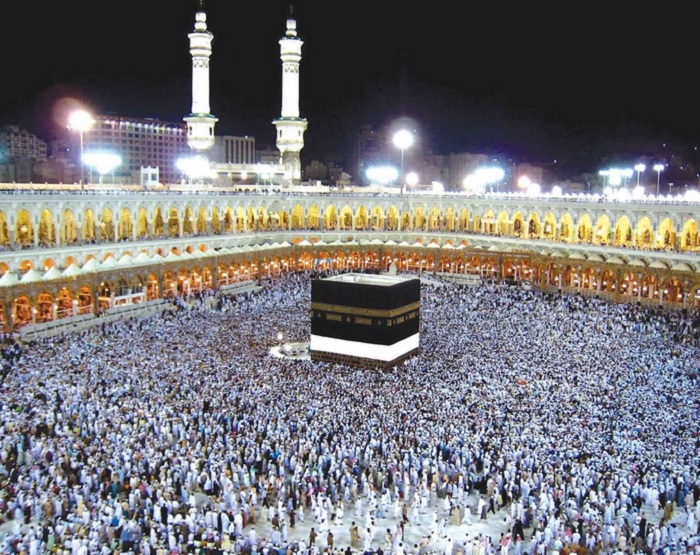



![Israeli tanks and APC’s gather by the Israeli – Lebanese border. Amid Israel’s escalating campaign against Hezbollah in Lebanon on September 30, 2024. [Erik Marmor/Getty Images]](https://en.minanews.net/wp-content/uploads/2024/10/IMG_20241001_203226-300x197.jpg)




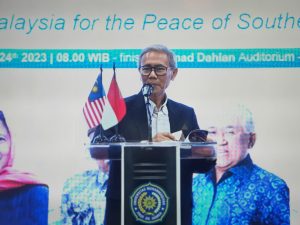
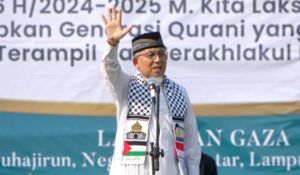
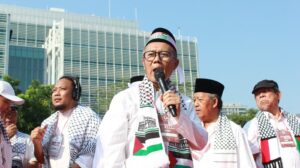
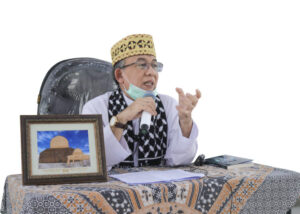

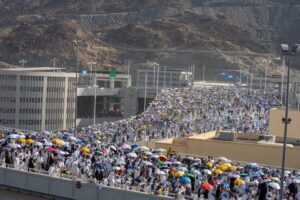
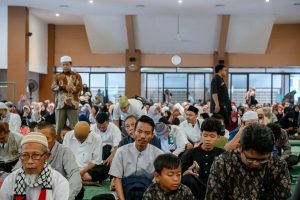





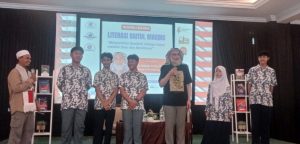


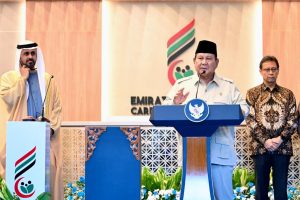



 Mina Indonesia
Mina Indonesia Mina Arabic
Mina Arabic